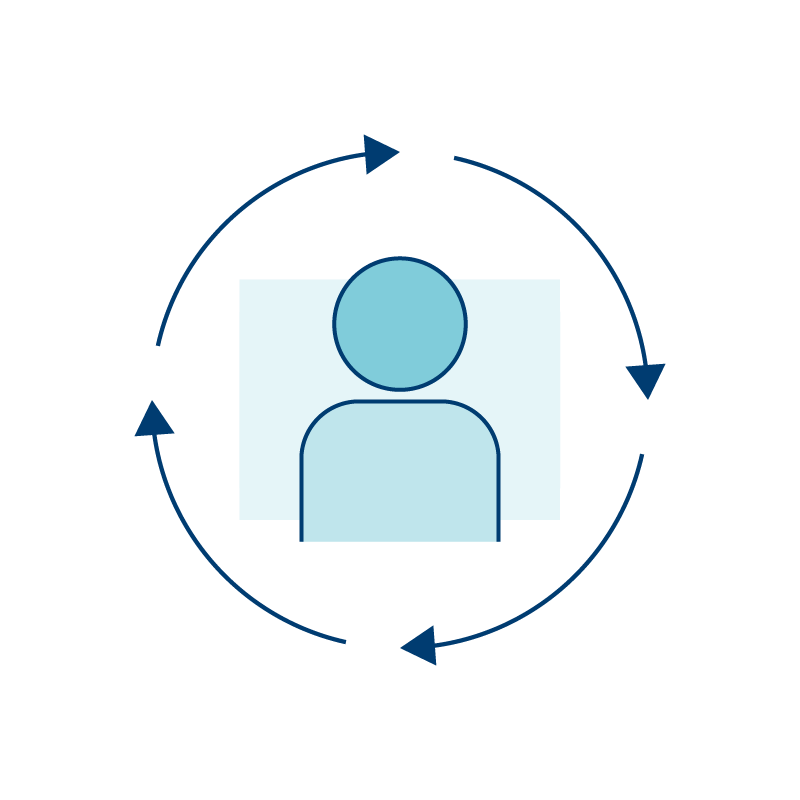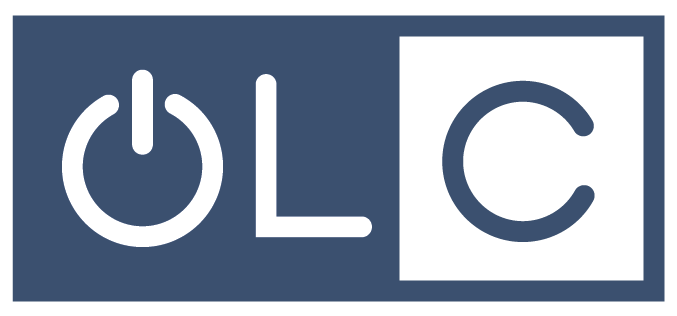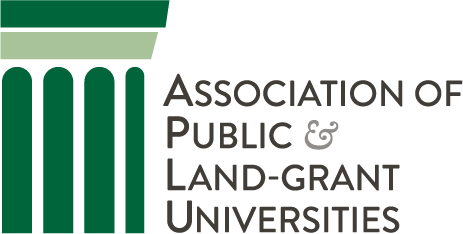
Incorporating new technology into existing systems and pedagogical practices can be challenging, especially as administrators, faculty, and students adjust to new methodologies and processes.
Every Learner Everywhere provides mentorship, training, and community-vetted resources for institutions to support the effective implementation of digital learning technology. We help faculty and administrators maximize the benefits of new technology and better navigate the hurdles of implementation using best practices from the field that reduce inequities in student outcomes.
Our network partners also collaborate to create flexible resources that meet the unique needs of different institutions and student populations. In the Fall of 2019, we supported ten institutions in the redesign of 41 courses that resulted in more accessible, adaptive, and equitable learning environments for students. With our continued guidance, each of these ten institutions will scale their pilot programs to reach more students and three new institutions are implementing innovative teaching solutions in the Spring of 2020.
Our support ranges depending on the needs of each institution, which vary widely due to differences between organizational cultures, instructor pedagogies, and student needs. With the joint goal of creating better student experiences and outcomes, we begin each engagement by assessing the needs of the institution and then help implement lasting, self-sustaining solutions. Instead of a linear approach, our services fall into three broad categories:
By leveraging digital tools & incorporating effective project management, there are three broad categories that describe the possible ways we can help:
We create a customized plan for each institution that may include any or all of the activities. This ensures our approach meets administrator, faculty, and student needs.

Evaluation and Analytics
Building institutional and instructor capacity for using course-level data to understand learner performance and improve instruction with digital learning.

Course Design and Delivery
Building institutional capacity to serve Black, Latino, Indigenous, poverty-affected, and first-generation students through digital learning with an equity-minded focus.

Planning for Professional Learning
Building institutional capacity to provide instructors and staff with appropriate and robust professional learning supports.

Student Success for Digital Learning
Building the institutional capacity to understand and offer the practices surrounding care for students in digital learning environments.
Narrative Practices in Digital Learning: Advancing Equitable Change Through Data-Informed Storytelling
In advancing access to education, institutional leaders will need to leverage narrative practices and storytelling as powerful tools to make sense of their teaching and learning environments and create digital strategy that supports all learners and not just a privileged few. This professional learning service will offer a series of frameworks (including OLC’s Framework for Storying Digital Changework), resources, and approaches to case-making and impactful storytelling as a means of instantiating generative actions and necessary change at all levels of the institution. Participants will leave this experience with the ability to contextualize strategic initiatives and collaborative action using both quantitative and qualitative measures, including disaggregated data and student voice. The inclusion of an open access interactive toolkit will provide participants with the ability to continually utilize and hone their skills in data-informed storytelling to better advance quality and equitable learning as an ethical imperative across their institution.
Participants
Format
- Core Components
- Facilitated HyFlex kickoff
- Self-paced asynchronous modules for faculty/staff
- Facilitated
- Optional Components
- Interactive toolkit
- Strategic consulting engagement
Duration
- 2 week engaged per cohort/section of core components
- Ongoing access to interactive toolkit
Outcomes
Learning Analytics and Data Coaching for Equity in Teaching and Learning
Academic and teaching staff are critical partners who are vital to creating a robust campus community of practitioners who are committed to understanding and employing student and course-level data in ways that support student learning and success. At many institutions, faculty, department chairs, and teaching and learning staff are often not directly included in these data communities and lack access to the training and resources necessary to design meaningful educational experiences that support equitable learning and outcomes for minoritized student groups. APLU provides academic and instructional data coaching to instructional designers, department chairs, and faculty in a one or two semester-long engagement. Each participating institution must include a cross-functional team with faculty who select a critical area of redesign in a gateway or introductory course. Teams will learn from APLU, exemplar faculty and instructional designers, and educational experts how to use learning analytics, student data, and course-level data to inform and improve teaching and learning, to adopt and implement equity center teaching practices, and to assess and continuously improve upon course delivery. Join us and learn how you can utilize data to make meaningful changes in the classroom and create more equitable student outcomes on your campus and in your classrooms.
Participants
Format
- Individual or cohort model; must include working with an institutional team with faculty (minimum); should include 3-6 multi-section courses
Duration
- 1-2 term option
Establishing a Culture of Continuous Improvement: Digital Learning Assessment Strategies and Tools
This workshop series introduces cohorts of participants to the concept of quality within digital learning, providing a series of resources, standards and criteria built on the pedagogical and research foundations for impactful online learning experiences. Participants will complete a formal course review, making recommendations for improvements at the course and program levels, and moving to the defining and refinement of institutional quality implementation strategies. This offering is meant to support a wide variety of stakeholders, including instructional designers, librarians, multimedia specialists, faculty, and support staff. Topics covered within this service include:
- Resources and Approaches to Online Course Evaluation and Assessment
- Building Buy-In and Support for Continuous Improvement
- Equity-Minded Digital Learning Assessment
- Course Redesign Practices Across Modalities
The inclusion of the train-the-trainer format will allow for this curriculum to be remixed and contextualized by institutional team members for future offerings from the institution.
Participants
Format
- Core Components
- Facilitated HyFlex kickoff
- Facilitated asynchronous train the trainer workshop
- Self-paced asynchronous modules for faculty/staff
- Optional Components
- Strategic consulting engagement
- Assessment and recommendations report
Duration
- 4 week engagement per cohort/section of core components
Designing Open & Culturally Responsive Digital Courses
This online course is designed for tribal college and university (TCU) faculty and support staff to learn the tools and strategies for designing effective, engaging, and learner-centered courses using digital tools and open content. The 6-week course, facilitated by ATD Teaching and Learning coaches, combines both asynchronous activities and weekly synchronous online meetings for a cohort of up to 30 TCU faculty and support staff. By the end of the course, participants will have drafted a course map and action plan for implementing an open course, as well as developed strategies for employing open and culturally affirming teaching practices designed to engage tribal college students. Course topics include:
- Developing Open Courses Using a Backward Design Framework
- Creating and Adapting Open Course Content for Indigenous Students
- Designing Equitable Digital Activities and Assessments
- Employing Open and Culturally Affirming Teaching Practices in Digital Environments
- Crafting Your Teaching Presence Online
- Course Review and Creating a Course Teaching Guide
ATD will survey participants at the end of each course and provide 1-2 page summary of participant feedback, course observations, and lessons learned.
Open Remix Practices: Processes, Methods, and Strategies for Increasing the Impact of Open Educational Resources Across the Institution
Open remix, defined as the objects, processes, and mindsets developed through the act of combining or manipulating open educational resources to create something new serves as an effective teaching and learning practice for its propensity to expand technological understanding, communication across semiotic modes, and engagement in networked communities. Extending from the mere use of open educational resources, this professional development offering discusses the digital literacies practices employed within open remix, including how remix is employed in digitally-mediated contexts to create new ideas, mindsets, systems, and processes. This workshop guides educators in a shift in focus from products created (open educational resources or OER) toward the open educational practitioners themselves, engaging in constructivist, social, and collaborative remix within digital spaces. Participants in this experience will learn strategies for utilizing open remix within course design and student engagement, as well as within digital and institutional strategy as a lever for increasing access to education.
Participants
Format
- Core Components
- Facilitated HyFlex Kickoff
- Facilitated asynchronous train the trainer workshops
- Self-paced asynchronous modules for faculty/staff
- Facilitated synchronous participant showcase
- Optional components
- Interactive tool kit
- Community of Practice
Duration
- 1-2 week engagement per cohort/section of core components
- Ongoing access to interactive toolkit
- 1 month engagement for Community of Practice
Charting the Landscape for Sustainable Digital Learning Infrastructure: From Courseware to Comprehensive Digital Strategy
This professional learning opportunity provides participants with the opportunity to take a holistic look at the infrastructure for digital learning at their institution across a lifecycle of assessment, adoption, and evaluation of efficacy and impact. The following themes will be covered as part of this service:
- Organizational Leadership Models for Supporting Digital Learning Capacity
- Courseware Selection and Implementation
- Funding and Resourcing Digital Learning Innovations
- Coordinating Digital and Institutional Strategy
In addition to providing experiential and collaborative engagement opportunities across cohorts, individual institutions may also choose to engage in consultative support and advising on their technological infrastructure looking across indicators of inclusivity, equity, and quality.
Participants
Format
- Core components
- Facilitated HyFlex kickoff
- Facilitated asynchronous workshop
- Optional components
- Strategic consulting engagement
- Assessment and recommendations report
Duration
2-3 week engagement per cohort/section of core components
Forging Sustainable Connections: Key Practices and Methods for Ensuring Ubiquitous Access to Quality Education
Innovative practices in digital learning have the propensity to increase engagement and student success, but only when access to the learning environment is equitable and inclusive. This professional learning opportunity offers micro and macro-level strategies for ensuring access to education amidst a landscape of internet connectivity and bandwidth issues, focusing on multimodal approaches to course design and development that center student care, belongingness, empowerment and agency. This workshop will also discuss institutional strategy in creating a technological infrastructure that supports sustainable access to education across diverse, multimodal approaches. Funding models for supporting student access will also be discussed, including leveraging mobile instruction, open educational practices, as well as socioculturally contextualized methods for building inclusive learning spaces for Indigenous, Black, Latino, and poverty-affected students.
Participants
Format
- Core Components
- Facilitated HyFlex kickoff
- Facilitated asynchronous workshop
- Facilitated synchronous participant showcase
- Optional Components
- Interactive toolkit
- Strategic consulting engagement
- Assessment and recommendations report
- Community of practice
Duration
- 2-3 week engagement per cohort/section of core components
- Ongoing access to interactive toolkit
- Semester long engagement for Community of Practice
Adaptive Placement and Summer Transition Service
APLU will assist institutions that are committed to leveraging bridge programs with adaptive technologies in mathematics and English to improve student high school outcomes, pathway to college, and equip students with success strategies. With support from APLU and its network of educational experts and exemplar institutions, universities will learn how to effectively adopt and implement digital instructional technologies and develop customized curricular programming that can improve student retention, course completion, and credit accumulation while decreasing students’ cost of education and time necessary to graduate. Universities will receive consultation services that will center the student experience, prioritizing the integration of proven policies and practices that improve student sense of belonging, mindset, sense of inclusive, and motivation. Participating universities will customize their approach on summer bridge programs, examples could include a summer bridge program continued use of adaptive tools, intensive student success orientation, co-requisite course, or a combination of these examples for incoming populations beyond local high school students. APLU will provide technical assistance to connect to additional project partners and vendors. Each partner will provide technical consulting on product use and implementation strategies.
Participants
Format
Individual institution or cohort model with deep institutional coaching and consultation
Duration
3-6 months or 1 term with 2 term option for inclusion of refinement/assessment
Disciplinary Communities of Practice
In this unique professional development opportunity, faculty can connect and collaborate with like-minded peers both within and outside of their institution. In a series of faculty and expert-led facilitated workshops, faculty will learn practical approaches to effective, equitable, and technology-supported teaching and learning. The communities are designed to encourage professional development, mentorship, and support for innovation in instructional practices. Depending on engagement by discipline and across institutions, participants will have the opportunity to meet both in discipline-specific communities and as a larger, interdisciplinary group. Community members will also engage with each other on a structured asynchronous platform where faculty can continue discussions, share resources, and advance the field’s understanding of how to best implement digital learning in their subject areas. Participants will share their experiences applying principles of culturally responsive teaching, digital learning, community building, and data-informed instruction to meet the needs of their courses and students. Dedicated disciplinary experts and facilitators will guide discussion and activities in the synchronous and asynchronous environments. The communities are led by the Association of Public and Land-grant Universities (APLU), in collaboration with the Every Learner Everywhere Network and our partner organizations Online Learning Consortium and Achieving the Dream.
Participants
Format
Facilitated communities/series of synchronous workshops; single institution or cohort model (must include group of faculty either within an institution or across institutions)
Duration
1 or 2 semester option (3-6 months)
Essentials of Quality and Equitable Digital Learning: From Design and Development to Facilitation and Engagement
This professional learning opportunity serves as a comprehensive deep dive into the quality charactistics of online learning, guiding participants through the unique affordances of digital learning environments, designing and developing online courses that center care, and creating multiple points of engagement across synchronous and asynchronous digital learning environments. This foundational service will build agency and confidence amongst instructional and design teams, covering the following topics:
- Principles of Equitable and Inclusive Digital Learning
- Instructor Presence and Student Engagement
- Data-Informed Content and Assessment Design
- Supporting Student Readiness and Expectations
- Designing with Equity and Access in Mind
- Fundamentals of Continuous Improvement
The series of customized trainings on equitable online education are specifically tailored to two key populations: 1) educators who might serve as mentors to faculty responsible for the design and facilitation of online courses; 2) the faculty themselves seeking resources and support for designing, facilitating, and assessing quality online instruction within inclusive digital learning environments.
Participants
Format
- Core Components
- Facilitated HyFlex kickoff
- Facilitated asynchronous train the trainer workshop
- Self-paced asynchronous modules for faculty/staff
- Facilitated synchronous participant showcase
- Optional Components
- Interactive toolkit
- Strategic consulting engagement
- Assessment and recommendations report
Duration
- 3 week engagement per cohort/section of core components
- Ongoing access to interactive toolkit
Adaptive Courseware for Equitable Student Success
The goal of this service is to support institutions in improving the quality of teaching and learning and increase student success measures for Black, Latino, Indigenous, poverty-affected, and first-generation student communities across learning modalities. Participating institutions will receive support in the form of technical assistance provided by APLU and its partnering network, coaching institutions, and consultants support to redesign critical gateway courses by aligning adaptive courseware technologies with improved pedagogical practices. Depending on which service model is selected (1-3 academic terms), universities will receive support in the design, implementation, and continuous improvement of redesigned courses leveraging adaptive courseware. The full-service model will include planning and scoping of adaptive courseware implementation, courseware selection guidance and training, instructional and course design coaching, data and learning analytics training for faculty and academic team members, one-to-one coaching with APLU and its network of experts and exemplar institutions, and regular engagement with a cohort of peer institutions. On-site campus visits may be available once per participating semester.
Format
Deep institutional coaching and consultation; regularly scheduled training workshops coaching sessions; institutional or cohort option
Duration
1-3 semesters available; depending on content selected by institution/cohort
Building a Culture of Student Care and Agentic Empowerment Through Digital Learning Innovation
This professional development offering engages stakeholders of diverse roles in critically examining the design, facilitation, and practices surrounding care for students in online, blended, and digital learning environments. As a comprehensive service, participants will take part in a series of flexible synchronous and asynchronous points of engagement, experiencing first-hand direct models and approaches for quality, equitable online learning that centers student care. Topics covered within this service include:
- Backwards Designing Student-Centered Digital Learning Environments;
- Using the Community of Inquiry Framework to Create Engagement with Content, Faculty and Peers;
- Amplyfying Student Presence, Belongingness and Voice;
This experience is designed to be offered to cross-institutional cohorts, but can also be situated for individual institutions as well. The inclusion of the train-the-trainer format will allow for this curriculum to be remixed and contextualized by institutional team members for future offerings from the institution.
Participants
Format
- Core Components
- Facilitated HyFlex Kickoff;
- Facilitated Asynchronous Train the Trainer Workshop;
- Self-Paced Asynchronous Modules for Faculty/Staff
- Facilitated Synchronous Participant Showcase
- Optional Components
- Interactive Toolkit
- Community of Practice
Duration
- 2-3 week engagement per cohort/selection of core components
- Ongoing access to interactive toolkit
- Semester long engagement for Community of Practice
Establishing a Culture of Continuous Improvement: Digital Learning Assessment Strategies and Tools
This workshop series introduces cohorts of participants to the concept of quality within digital learning, providing a series of resources, standards and criteria built on the pedagogical and research foundations for impactful online learning experiences. Participants will complete a formal course review, making recommendations for improvements at the course and program levels, and moving to the defining and refinement of institutional quality implementation strategies. This offering is meant to support a wide variety of stakeholders, including instructional designers, librarians, multimedia specialists, faculty, and support staff. Topics covered within this service include:
- Resources and Approaches to Online Course Evaluation and Assessment
- Building Buy-In and Support for Continuous Improvement
- Equity-Minded Digital Learning Assessment
- Course Redesign Practices Across Modalities
The inclusion of the train-the-trainer format will allow for this curriculum to be remixed and contextualized by institutional team members for future offerings from the institution.
Participants
Format
- Core Components
- Facilitated HyFlex kickoff
- Facilitated asynchronous train the trainer workshop
- Self-paced asynchronous modules for faculty/staff
- Optional Components
- Strategic consulting engagement
- Assessment and recommendations report
Duration
- 4 week engagement per cohort/section of core components
Open Remix Practices: Processes, Methods, and Strategies for Increasing the Impact of Open Educational Resources Across the Institution
Open remix, defined as the objects, processes, and mindsets developed through the act of combining or manipulating open educational resources to create something new serves as an effective teaching and learning practice for its propensity to expand technological understanding, communication across semiotic modes, and engagement in networked communities. Extending from the mere use of open educational resources, this professional development offering discusses the digital literacies practices employed within open remix, including how remix is employed in digitally-mediated contexts to create new ideas, mindsets, systems, and processes. This workshop guides educators in a shift in focus from products created (open educational resources or OER) toward the open educational practitioners themselves, engaging in constructivist, social, and collaborative remix within digital spaces. Participants in this experience will learn strategies for utilizing open remix within course design and student engagement, as well as within digital and institutional strategy as a lever for increasing access to education.
Participants
Format
- Core Components
- Facilitated HyFlex Kickoff
- Facilitated asynchronous train the trainer workshops
- Self-paced asynchronous modules for faculty/staff
- Facilitated synchronous participant showcase
- Optional components
- Interactive tool kit
- Community of Practice
Duration
- 1-2 week engagement per cohort/section of core components
- Ongoing access to interactive toolkit
- 1 month engagement for Community of Practice
Essentials of Quality and Equitable Digital Learning: From Design and Development to Facilitation and Engagement
This professional learning opportunity serves as a comprehensive deep dive into the quality charactistics of online learning, guiding participants through the unique affordances of digital learning environments, designing and developing online courses that center care, and creating multiple points of engagement across synchronous and asynchronous digital learning environments. This foundational service will build agency and confidence amongst instructional and design teams, covering the following topics:
- Principles of Equitable and Inclusive Digital Learning
- Instructor Presence and Student Engagement
- Data-Informed Content and Assessment Design
- Supporting Student Readiness and Expectations
- Designing with Equity and Access in Mind
- Fundamentals of Continuous Improvement
The series of customized trainings on equitable online education are specifically tailored to two key populations: 1) educators who might serve as mentors to faculty responsible for the design and facilitation of online courses; 2) the faculty themselves seeking resources and support for designing, facilitating, and assessing quality online instruction within inclusive digital learning environments.
Participants
Format
- Core Components
- Facilitated HyFlex kickoff
- Facilitated asynchronous train the trainer workshop
- Self-paced asynchronous modules for faculty/staff
- Facilitated synchronous participant showcase
- Optional Components
- Interactive toolkit
- Strategic consulting engagement
- Assessment and recommendations report
Duration
- 3 week engagement per cohort/section of core components
- Ongoing access to interactive toolkit
Building a Culture of Student Care and Agentic Empowerment Through Digital Learning Innovation
This professional development offering engages stakeholders of diverse roles in critically examining the design, facilitation, and practices surrounding care for students in online, blended, and digital learning environments. As a comprehensive service, participants will take part in a series of flexible synchronous and asynchronous points of engagement, experiencing first-hand direct models and approaches for quality, equitable online learning that centers student care. Topics covered within this service include:
- Backwards Designing Student-Centered Digital Learning Environments;
- Using the Community of Inquiry Framework to Create Engagement with Content, Faculty and Peers;
- Amplyfying Student Presence, Belongingness and Voice;
This experience is designed to be offered to cross-institutional cohorts, but can also be situated for individual institutions as well. The inclusion of the train-the-trainer format will allow for this curriculum to be remixed and contextualized by institutional team members for future offerings from the institution.
Participants
Format
- Core Components
- Facilitated HyFlex Kickoff;
- Facilitated Asynchronous Train the Trainer Workshop;
- Self-Paced Asynchronous Modules for Faculty/Staff
- Facilitated Synchronous Participant Showcase
- Optional Components
- Interactive Toolkit
- Community of Practice
Duration
- 2-3 week engagement per cohort/selection of core components
- Ongoing access to interactive toolkit
- Semester long engagement for Community of Practice



